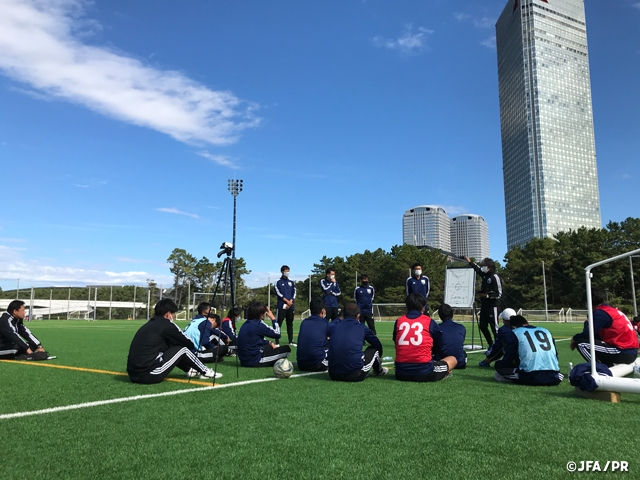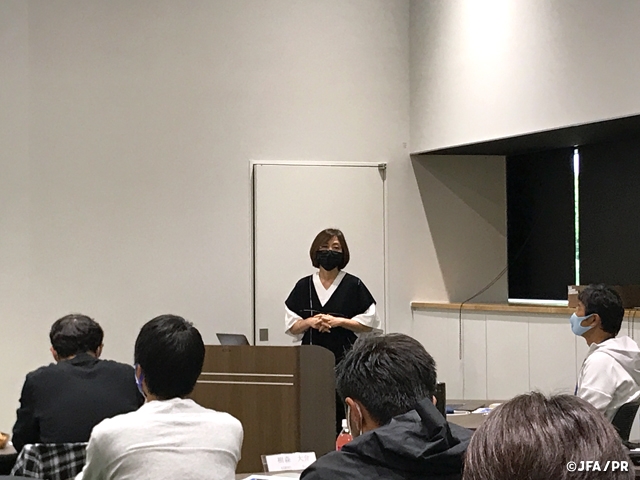NEWS
Class S Coach Training Course 2021 Module4/Intensive Course (7) Participant's Report Vol.10
29 October 2021

The Class S Coach Training Course 2021 Module 4 started on Monday 18 October, as the participants were gathered at Prince Takamado Memorial JFA YUME Field for the first time in about six months since the Module 1 intensive course held at the end of April. Since the course has been held online for a while, the participants were highly motivated to be given the opportunity to face the lecturers in real life and hold face to face discussions with their peers, as the final stage of the course has started, with the final exam to be held in December.
Module4 Intensive Course (7)
Date: Mon. 18 - Thu. 21 October
| Mon. 18 October | ・Team building: Tokyo Denki University Instructor FUKUTOMI Shinya ・Module4 Guidance: SUZUKI Jun (JFA Class S Instructor) |
|---|---|
| Tue. 19 October | ・Practical coaching session ・Mental Training: TANAKA OULEVEY Miyako ・Nadeshiko Japan training observation |
| Wed. 20 October | ・Practical coaching session ・Professional coaching theory: Coach MORIYASU Hajime (Japan National Team) |
| Thu. 21 October | ・Practical coaching session ・Media theory I: Hosei University Professor YAMAMOTO Hiroshi |
Support Player: Meikai University Football team, Edogawa University Football Club
Participant's Comment
Coach TSUJITA Masateru (Zweigen Kanazawa U-18)
Five weeks following the third module, “Module 4 Intensive Course” was held at Prince Takamado Memorial JFA YUME Field, as the schedule consisted of eight practical coaching sessions and four lectures: “Team building,” “Mental Training,” “Media theory,” and “Professional coaching theory.”
In the “Team Building” session, we learned that team building is effective and successful only for coaches and teams who believe in its value. We also learned how to ensure “safety of mind” as a coach and welcome diversity to revitalise both individuals and organisations during this era of VUCA, where there is a wide range of information and uncertainty with no right answers.
From the lecture on “Mental Training,” we learned that emotions are not controllable, even though they are often thought to be controllable, and that is why it is important to understand that there are different types of emotions and motivations. We also learned that in the world of mental health, there is no such thing as mental strength or weakness, but there is mental toughness, which is the ability to cope with any mental situation. We learned that we could get better at dealing with our mental health by always being aware and consistent with our capabilities.

In “Media Theory,” we learned the difference between sports-media and media-sports, the types of interviews and the characteristics of each type, tips for dealing with the media, how to make a good impression when you introduce yourself, and that it is important to always prepare as if you are speaking in public.
In the “Professional coaching theory” section, coach MORIYASU Hajime talked about how he thinks about building relationships with the city and country, his ideal coaching style, and the benefits of having the same coach leading both the Olympics and the senior national team. Based on anecdotes of his experiences with the Japan National Team, he shared us with the tension and mental state of the players before entering a match, and also showed us his match-notes, which gave us a close insight of his real life experiences as a coach.

In the practical coaching sessions, the non-improvement side was set up as 4-4-2, and eight participants worked on seven themes using their own systems. During each session, the focal point was set on whether or not the opponent would change their system from 4-4-2, and if so, when and how they would make the shift. After each session, the participant in charge explained their intentions and impressions, while other participants shared their opinions from various perspectives. We were able to hold lively discussions which gave me many new findings and hints that can be implemented to my own trainings.

I am grateful to be given this opportunity to study football from many different angles with my fellow participants, instructors, staff, players from Meikai University and Edogawa University who are participating as support players, assistant students, and lecturers. I will continue to work hard to keep moving forward.
Next time we will share the report of coach NAKAMURA Motohiko (Kanagawa Football Association).
Related News
-
Coaches
2021/09/24
Class S Coach Training Course 2021 Module3/Intensive Course (6) Participant's Report Vol.9

-
Coaches
2021/09/17
Class S Coach Training Course 2021 Module3/Intensive Course (5) Participant's Report Vol.8

-
Coaches
2021/09/09
Class S Coach Training Course 2021 Module 3/Short-course (3) Participant's Report Vol. 7

-
Coaches
2021/06/25
Class S Coach Training Course 2021 Module2/Intensive Online Course (4) Participant's Report Vol.6

-
Coaches
2021/06/18
Class S Coach Training Course 2021 Module 2/Intensive Online Course (3) Participant's Report Vol. 5

Latest News
-
National Teams
2026/01/07
Japan Futsal National Team squad & schedule - AFC Futsal Asian Cup™ Indonesia 2026 (1/15-2/8@Jakarta, Indonesia)

-
National Teams
2025/12/28
U-23 Japan National Team squad & schedule - AFC U23 Asian Cup Saudi Arabia 2026™ (12/30-1/26@Jeddah, Saudi Arabia)

-
National Teams
2025/12/15
Japan Beach Soccer National Team squad & schedule - Training Camp (12/17-20@Okinawa)

-
National Teams
2025/12/15
U-22 Japan National Team squad & schedule - IBARAKI Next Generation Cup 2025 (12/21-27@K's denki Stadium Mito, Ibaraki)

-
National Teams
2025/12/12
U-18 Japan National Team squad & schedule - SBS CUP INTERNATIONAL Youth Soccer 2025 (12/15-21@Shizuoka)


